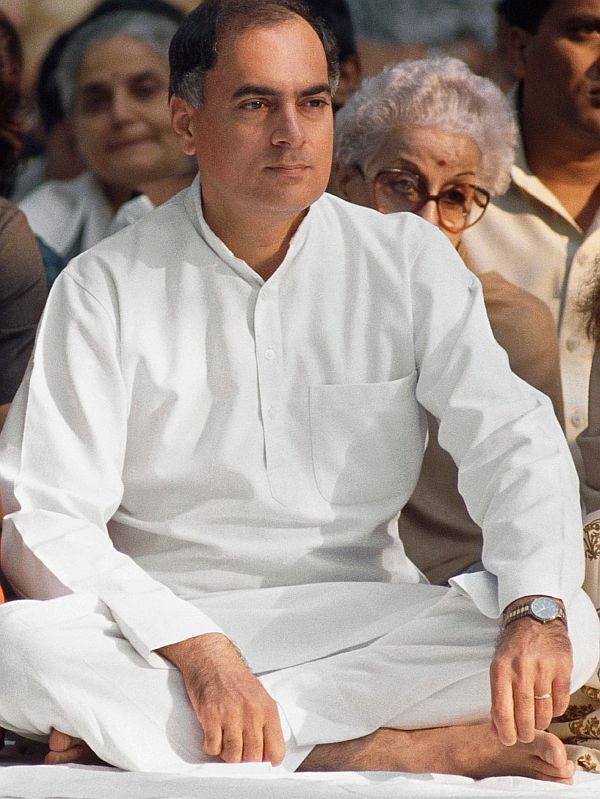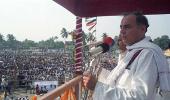'But for Rajiv's bloopers, the Hindutva campaign would not have got off the ground,' Amulya Ganguli points out.

Narendra Damodardas Modi should be thankful to Rajiv Gandhi rather than blame him on various counts, ranging from the 1984 pogrom against Sikhs to enjoying a holiday aboard a warship.
Rajiv played a seminal role in boosting the BJP's Hindutva project.
But for Rajiv's bloopers, the Hindutva campaign would not have got off the ground.
His first blunder was to negate the Supreme Court's Shah Bano judgment granting alimony to a divorced Muslim woman.
Rajiv's first instincts were right, for he deputed Arif Mohammed Khan in Parliament to uphold the verdict.
Had this line prevailed, the BJP wouldn't have had the ghost of a chance to exploit the issue and would have continued to languish in the political wilderness as it was at the time with its two Lok Sabha seats.
But then, the Congres's old habit of snatching defeat from the jaws of victory came into play.
Orthodox Muslim elements in the party convinced the prime minister that the apex court had interfered in an issue which fell within the purview of the Shariat, and that this would alienate the Muslims from the Congress.
With little experience in sociology and politics, and surrounded by scheming courtiers like Arun Nehru (who later joined the BJP), Rajiv overruled Khan and decided to go against the apex court's diktat by enacting a law which was in tune with the Shariat.
Having had their say in a matter of the civil law, some Congressmen as well as assorted Muslim bigots wanted the government to implement the criminal laws of the Shariat as well, which would have meant cutting off the hands of thieves and stoning those guilty of adultery and homosexuality to death.
Mercifully, the government did not go that far.
Even then, all this was grist to the BJP's Hindutva mill, the thin end of the wedge which proved its longstanding charge of Muslim appeasement by the Congress.
Realising belatedly that he had blundered by bowing to the Muslim zealots, Rajiv made his second mistake of bowing to the Hindu zealots as well by deciding to unlock the gates of the Babri Masjid, which were under lock and key ever since idols were surreptitiously installed in the mosque in 1949.
But for these two missteps, which together made for a huge howler, India would not have taken the turn towards extreme right-wing politics which it did from the mid-1980s.
There is little doubt that Rajiv alone is responsible for this fateful turn of events.
Modi and the BJP should be grateful to him, therefore, for bringing them out of the darkness of the margins of politics into the light of the main stage.
But the irony is that they can hardly acknowledge the remarkable contribution to their growth by a former Congress prime minister and that, too, a hated dynast.
Instead, the saffron brotherhood will convince itself that its campaign to 'liberate' the Ram Janambhoomi, the birthplace of Lord Ram, led to the BJP's growth.
Nor can the Congress admit that one of its icons gave such a massive leg-up to a marginal party to enable it to become a major opponent.
Both Modi and Rahul Gandhi will peddle, therefore, a false account of Rajiv's life with one side painting him in dark colours and the other presenting him as India's first PM to have spoken of taking the country into the 21st century.
Both pictures have gaping holes.
Amulya Ganguli is a writer on current affairs.











 © 2025
© 2025